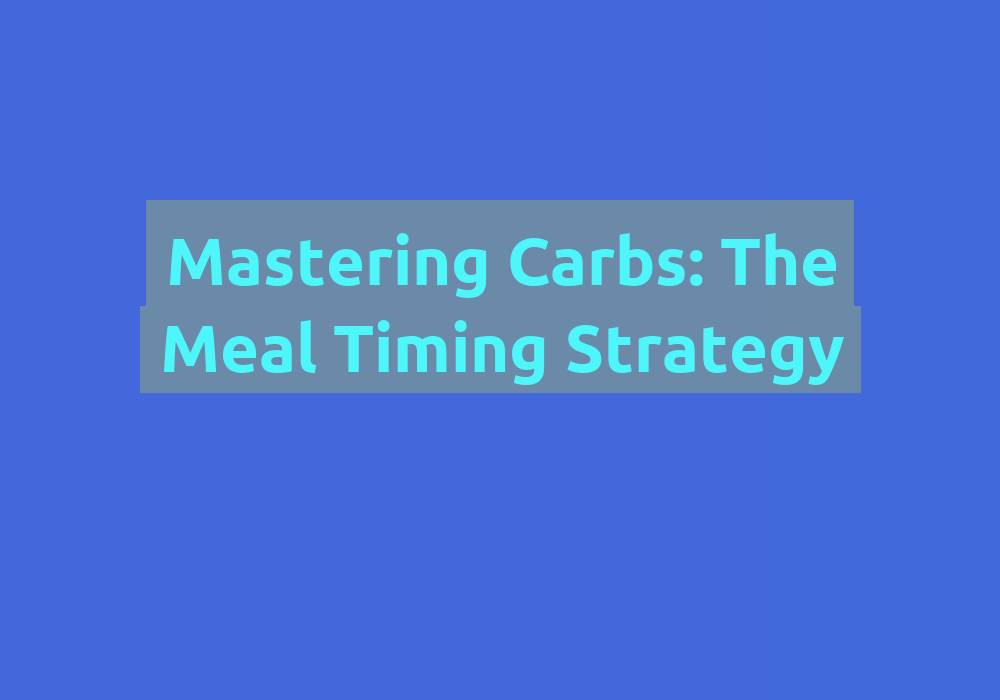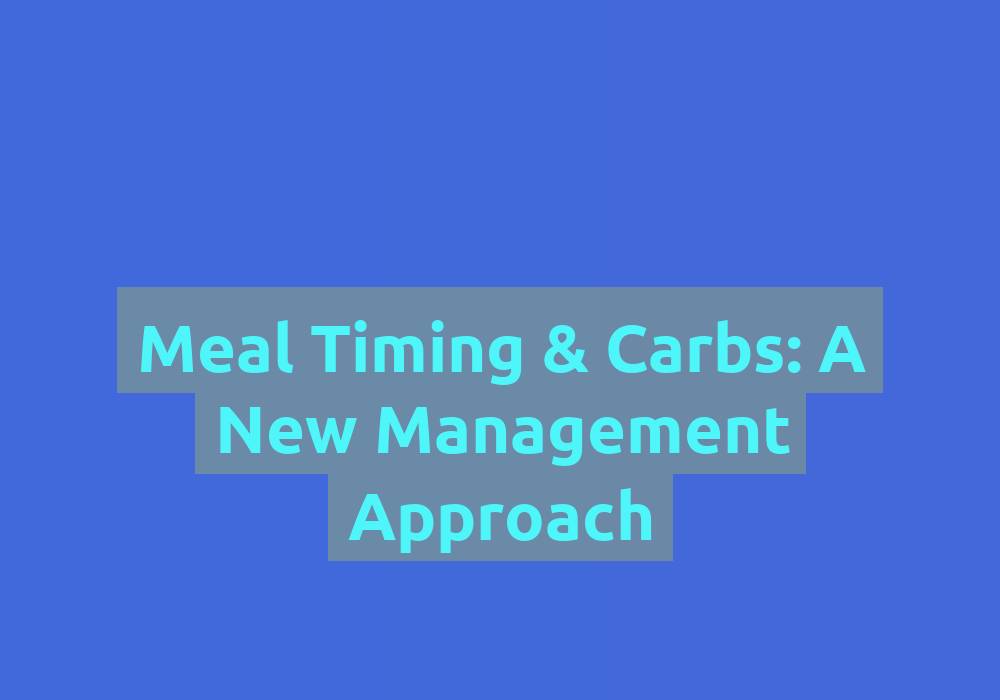Timely Carb Control: Mastering Meal Timing

In the world of nutrition and fitness, meal timing plays a crucial role in achieving your health and fitness goals. One of the key aspects of meal timing is carb control, which involves managing your carbohydrate intake at specific times of the day. By mastering meal timing and incorporating effective strategies for carb control, you can optimize your energy levels, promote weight management, and enhance overall performance. In this article, we will delve into the importance of timely carb control and provide valuable insights and tips to help you make the most out of your nutrition plan.
Understanding Carbohydrates and their Role in the Body
Before we dive into the specifics of carb control, it’s important to understand the role of carbohydrates in the body. Carbohydrates are one of the three macronutrients, along with proteins and fats. They are the body’s primary source of energy and play a significant role in various physiological processes.
When we consume carbohydrates, they are broken down into glucose, which is then transported to cells to provide energy. Additionally, carbohydrates are also involved in the synthesis of glycogen, which is stored in the muscles and liver for future energy needs.
Carbohydrates come in two main forms: simple and complex. Simple carbohydrates, also known as sugars, are found in foods like fruits, candies, and sweetened beverages. They are quickly digested and provide a rapid source of energy. Complex carbohydrates, on the other hand, are found in foods like whole grains, legumes, and vegetables. They take longer to digest and provide a more sustained release of energy.
It’s important to note that not all carbohydrates are created equal. Choosing the right sources of carbohydrates is crucial for maintaining a balanced and healthy diet. Opt for complex carbohydrates, as they are rich in fiber, vitamins, and minerals, and provide a steady release of energy. Avoid refined and processed carbohydrates, as they can lead to rapid blood sugar spikes and crashes.
The Significance of Timely Carb Control
Carb control is all about strategically manipulating your carbohydrate intake to optimize energy utilization and overall health. It involves adjusting the timing and quantity of carbs consumed based on your individual needs and goals. Here are some reasons why mastering meal timing and carb control can be beneficial:
Energy Management: Consuming carbohydrates at the right times can provide a sustained release of energy throughout the day. By timing your carb intake to align with your activity levels, you can ensure adequate fuel for workouts and prevent energy crashes.
Weight Management: Timely carb control can be an effective strategy for weight management. By consuming carbohydrates when your body needs them the most, such as before or after physical activity, you can prevent excessive carb storage as fat.
Blood Sugar Regulation: Proper meal timing and carb control can help stabilize blood sugar levels. By avoiding large spikes and drops in blood sugar, you can reduce cravings, maintain energy levels, and support overall metabolic health.
Optimal Performance: For athletes and individuals involved in high-intensity training, mastering meal timing and carb control is essential for maximizing performance. By strategically timing carb intake, you can ensure optimal glycogen stores, which are crucial for endurance and strength during workouts.
To effectively control your carb intake, it’s important to consider your individual needs and goals. Everyone’s carbohydrate requirements may vary based on factors such as age, activity level, and overall health. It’s recommended to consult with a registered dietitian or nutritionist to determine the optimal carb intake for your specific needs.
Strategies for Timely Carb Control
Now that we understand the importance of timely carb control, let’s explore some practical strategies to incorporate into your nutrition plan:
1. Identify Your Activity Levels
Start by assessing your daily activity levels. If you have a sedentary lifestyle, your carbohydrate needs may be different compared to someone who exercises regularly. Determine whether you need higher carb intake on active days or if you can reduce carb consumption on rest days. This will help ensure that you’re fueling your body appropriately for your level of activity.
2. Pre- and Post-Workout Nutrition
To optimize performance and recovery, focus your carb intake around your workouts. Consuming carbohydrates before exercising can provide a readily available energy source. Aim for easily digestible carbs, such as fruits or whole grains, about 1-2 hours before your workout. This will give your body enough time to break down and utilize the carbohydrates for fuel during exercise.
After your workout, replenish your glycogen stores by consuming carbs along with protein for muscle repair. This can be achieved through a post-workout meal or snack that includes a combination of carbohydrates and a lean source of protein, such as chicken, fish, or tofu. This combination will help support muscle recovery and growth.
3. Tailor Carb Intake to Time of Day
Consider adjusting your carb intake based on the time of day. For example, consuming most of your carbs earlier in the day can provide sustained energy and prevent excessive carb storage. This can be beneficial for individuals who are more active during the day and have higher energy demands in the morning and afternoon.
In contrast, reducing carb intake in the evening can support better sleep quality and fat burning during sleep. This is because excessive carb consumption before bed can lead to a spike in blood sugar levels, which may interfere with sleep patterns and contribute to weight gain. Instead, focus on consuming a balanced meal that includes protein, healthy fats, and vegetables in the evening.
4. Choose the Right Carbohydrate Sources
Not all carbs are created equal. Opt for complex carbohydrates, such as whole grains, legumes, and vegetables, which provide a steady release of energy and are rich in fiber. These foods also offer additional nutrients and promote feelings of fullness, which can help with weight management.
Avoid refined and processed carbs, as they are often stripped of their natural fiber and nutrients. These include foods like white bread, pastries, sugary cereals, and sugary beverages. They can lead to rapid blood sugar spikes and crashes, which can negatively impact energy levels and overall health.
5. Listen to Your Body
Every individual is unique, so it’s important to listen to your body’s signals. Pay attention to how different carb timings and quantities affect your energy levels, satiety, and overall well-being. Adjust your approach accordingly and consult with a registered dietitian or nutritionist if needed. They can provide personalized guidance and support based on your specific needs and goals.
Conclusion
Mastering meal timing and carb control is a powerful strategy for optimizing your nutrition plan and reaching your health and fitness goals. By understanding the role of carbohydrates, the significance of timely carb control, and implementing effective strategies, you can enhance energy levels, support weight management, and improve overall performance. Remember, consistency and individualization are key when it comes to finding the right approach for your body. Start by incorporating the strategies outlined in this article and make adjustments based on your own unique needs and preferences. With the right knowledge and a well-planned nutrition plan, you can achieve optimal results and enjoy a healthy and balanced lifestyle.
This response has been generated by an AI language model and may not be grammatically correct.

